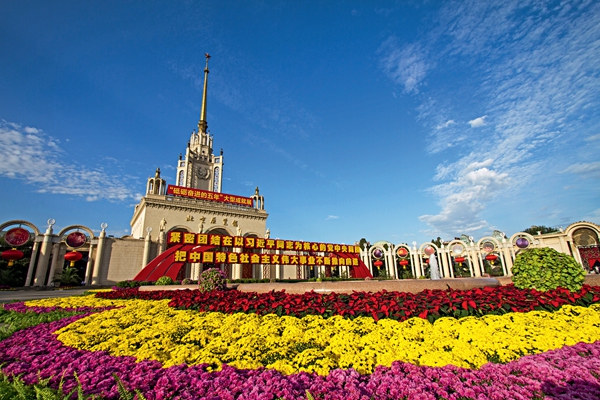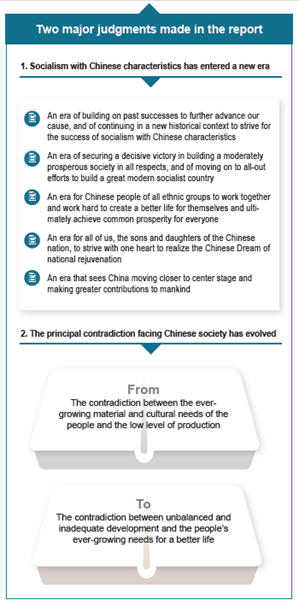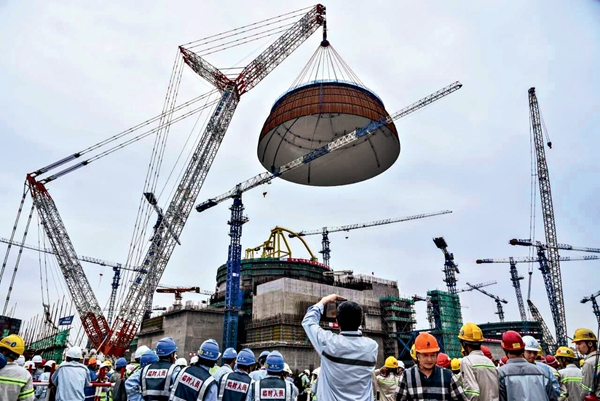By XIA YIPU
THE five years since the 18th National Congress of the Communist Party of China (CPC) in 2012 are an extraordinary period in the course of the Party and the state’s development. It is a time when, facing a slew of profound changes at home and abroad including a sluggish world economic recovery, recurrent regional tensions and conflicts, festering global issues and the Chinese economy entering a “new normal,” China has, under the leadership of the CPC, solved many tough problems that were long overdue on the agenda but never resolved, and accomplished many goals set but not previously attained.

A large exhibition featuring
After an arduous journey since it adopted reform and opening-up policy,
Key Concepts
In the past five years the CPC set two centenary goals and the goal to realize the Chinese Dream of national rejuvenation, which reflects the Party’s self-confidence. Meanwhile it has demonstrated greater resolve in self-improvement, picking up efforts to exercise full and rigorous self-governance.
CPC General Secretary Xi Jinping first used the term “full and rigorous governance over the Party” during an inspection tour of Jiangsu Province in December 2014, and included it in the nation’s Four-Pronged Comprehensive Strategy (which is to make comprehensive moves to finish building a moderately prosperous society in all respects, deepen reform, advance law-based governance and strengthen Party self-governance). Previously the notion was “rigorous governance over the Party.” By adding “full” to the phrase, the General Secretary made the theoretical innovation of expanding Party building to five realms – thinking, organization, moral conduct, anti-corruption, institutions – and answered the significant question of “how does the Party exercise self-governance.” It marks a big advance in Party building.

The Scientific Outlook on Development is about what kind of development
New Historical Positioning
During his tour of southern
In this new era, Chinese people of all ethnic groups will work together and work hard to create a better life for themselves and ultimately achieve common prosperity for everyone. It is the original aspiration and the mission of Chinese Communists to strive for the wellbeing of the Chinese people and the rejuvenation of the Chinese nation, which is also the essential demand of Chinese socialism.

As the world’s second largest economy,
We are now in an era when
By offering its experience, lessons, and achievements in reform, opening-up and socialism building to the development of international socialism and humankind, China accentuates the international influence of the path, the theory, the system and the culture of socialism with Chinese characteristics, and offers other developing countries a new option for modernization. This is the appeal and advantage of Chinese socialism in the new era.
New Principal Contradiction
Correctly identifying the principal contradiction in the Chinese society is of historical significance for the overall development of

Sohu-backed Sogou is listed on the New York Stock Exchange on November 9, 2017.
The statement of the new contradiction precisely reflects the status quo of Chinese social development. With its GDP now standing at RMB 80 trillion and per capita GDP at US $8,260, China has left behind it the time of deficiency, but is still plagued by imbalance and inadequacy in regional and structural development, grappling with both structural surplus and deficiency.
A glaring example is the bike sharing service, which has mushroomed since 2016 and spread to every corner in
In coping with the new contradiction the CPC must firmly stand by the people, addressing their needs and answering their call for a better life. In the past five years
China has also tore into housing speculation, and is moving faster to put in place a housing system that ensures supply through multiple sources, provide housing support through multiple channels, and encourages both housing purchase and renting. These measures all testify the CPC’s commitment to serving the people and relying on the people.
Nowadays, Chinese people expect more from life. They are no longer satisfied with having the basic needs of subsistence – enough food and clothes – and turn their backs to equalitarianism. Their needs in life are of higher levels, better quality and greater diversity.
When talking of the trend of Chinese families sending children to study abroad, Shanghai University President Jin Donghan, who was also a delegate to the 19th National Congress of the CPC, commented: “
The insight into the principal contradiction in Chinese society indicates the theoretical height, depth, and breadth of Xi Jinping’s Thought on Socialism with Chinese Characteristics for a New Era.
New Goals, New Journey
In response to the new era, the CPC has fine-tuned
The goal for the first stage, from the beginning of reform and opening-up to 1990, is to meet the basic needs of the people. For the second stage, from 1991 to 2000, the goal is to have people live a decent life. For the third stage, from 2001 to 2020, the goal is to complete building a moderately prosperous society in all respects. For the fourth stage, from 2021 to 2035, the goal is to basically realize socialist modernization. And in the fifth stage, from 2036 to 2050, our goal is to build
The 19th CPC National Congress set the time to basically realize socialist modernization 15 years earlier than previously scheduled. This indicates on one hand that
The Congress’ definition of the great modern socialist country we are working to build resonates with the nation’s Five-sphere Integrated Plan (which is to promote coordinated economic, political, cultural, social and ecological advancement). It reveals that
A New Thought
Xi Jinping’s Thought on Socialism with Chinese Characteristics for a New Era builds on and further enriches Marxism-Leninism, Mao Zedong Thought, Deng Xiaoping Theory, the Theory of Three Represents, and the Scientific Outlook on Development. It is the latest achievement in adapting Marxism to the Chinese context and another innovation in the guiding theories of the CPC.
This thought is based on the understanding that
Covering every aspect of
The thought makes it clear that the basic policy underpinning our endeavors to uphold and develop socialism with Chinese characteristics in the new era consists of 14 points: Ensuring Party leadership over all work, committing to a people-centered approach, continuing to comprehensively deepen reform, adopting a new vision for development, seeing that the people run the country, ensuring every dimension of governance is law-based, upholding core socialist values, ensuring and improving living standards through development, ensuring harmony between humans and nature, pursuing a holistic approach to national security, upholding absolute Party leadership over the people’s armed forces, upholding the principle of “one country, two systems” and promoting national reunification, promoting the building of a community with a shared future for mankind, and exercising full and rigorous governance over the Party.
At such breadth and depth, Xi Jinping’s Thought on Socialism with Chinese Characteristics for a New Era deepens our understanding of the laws that underlie governance by a Communist party, the development of socialism, and the evolution of human society.
The era is the mother of thought; practice is the fount of theory. The new era we have come to has inspired new practices that yield new thoughts. Xi Jinping’s Thought on Socialism with Chinese Characteristics for a New Era stands for Marxism of 21st century
XIA YIPU is an associate researcher with